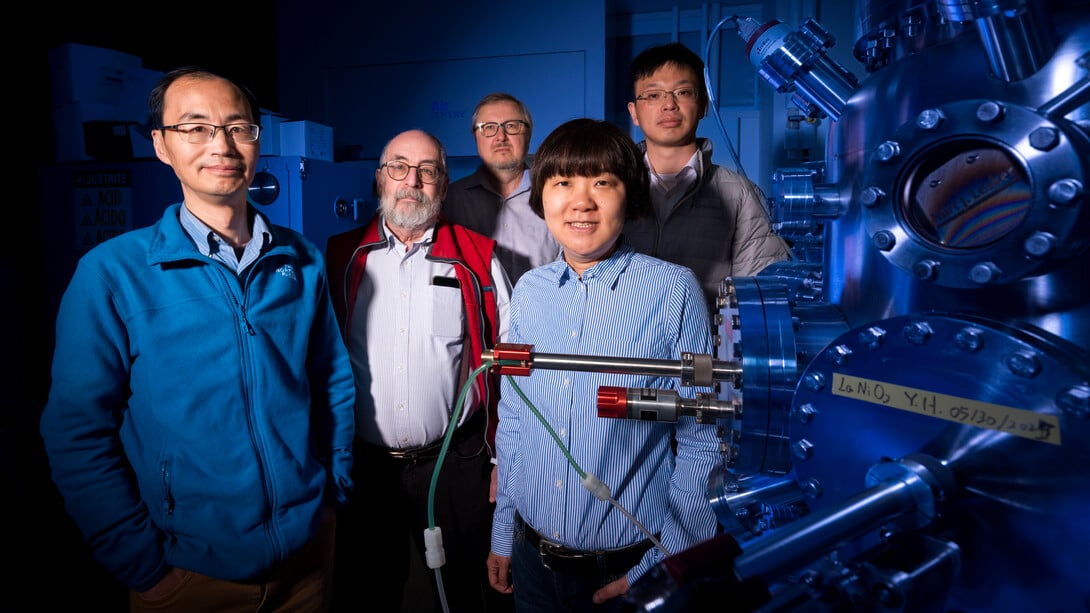Science
Nebraska University Secures $2.5 Million for Quantum Research

The University of Nebraska–Lincoln has been awarded a significant grant of $2.5 million from the national Department of Energy. This funding will support research into ferroelectric oxides, which are crucial for exploring new quantum phases and developing more efficient electronic devices. A dedicated team, led by Xia Hong, a professor of physics and astronomy, aims to advance control over oxide and van der Waals materials in ways that were previously deemed unattainable.
The research team, consisting of seven members, is focused on manipulating states of matter, such as transitioning between metallic and insulating properties or altering magnetic characteristics. “The overarching goal is to use nanoscale control of ferroelectricity to induce a new state of matter,” Hong stated. She emphasized that this project, titled “Emergent Interface Phenomena Enabled by Ferroelectric Oxide Thin Films and Membranes,” aims to foster the design of smaller and more energy-efficient devices.
Expanding Research Capabilities
The grant is part of the Established Program to Stimulate Competitive Research (EPSCoR) initiative and marks the third major funding award for the university’s Emergent Quantum Materials and Technologies (EQUATE) Center in recent months. Previously, Christian Binek, director of EQUATE, received $1.8 million through the National Science Foundation’s EPSCoR program for research on innovative two-dimensional materials. Additionally, an international team led by Evgeny Tsymbal secured $2 million for a project under the NSF’s Designing Materials to Revolutionize and Engineer Our Future program.
“These awards build on the momentum created when EQUATE was established nearly five years ago with a $20 million NSF grant,” Binek remarked. “They will allow us to continue pursuing this vital area of research and to expand our expertise in quantum materials science here in Nebraska.”
The current grant prioritizes workforce development, intending to enhance the research community. It will support three early-career scientists, including Zuocheng Zhang from the University of Nebraska–Lincoln and Tula Paudel and Alexey Lipatov from the South Dakota School of Mines and Technology. Each team member will also engage graduate and postdoctoral researchers, alongside opportunities for undergraduate students to participate in the research efforts.
Innovative Research Aims
Hong elaborated on the grant’s three primary research thrusts. The first focuses on the interaction between ferroelectric oxides and strongly correlated oxides, aiming to control quantum phase transitions reversibly. The goal is to switch between metallic and insulating states using ferroelectric polarization rather than destructive methods like high pressure or chemical substitutions. This could lead to a low-voltage, fully switchable control mechanism suitable for binary logic and memory devices. “This is our competitive edge — we have a new technique that is very special and energy efficient,” Hong noted.
The second research thrust explores multiferroic systems that combine ferroelectricity and magnetism. The team will utilize various doping methods to convert ferroelectric insulators into polar metals, potentially enabling low-energy data storage through electric fields that switch magnetic states.
The third thrust aims to create superlattices of ferroelectric domains. This approach is expected to engineer new electronic and optical properties in two-dimensional van der Waals materials. By adjusting the rotation angle between two oxide layers using stacking techniques, the researchers hope to induce new Moiré patterns and emergent electronic and magnetic states.
Success in these research endeavors could pave the way for innovative platforms in smartphones and other electronic devices, leading to enhanced performance and energy efficiency. Despite the high-stakes nature of their work, Hong emphasizes that their passion for fundamental science drives their research. “Even if you don’t see the impact right away, you are motivated by curiosity and the beauty of nature,” she concluded.
-

 Lifestyle4 months ago
Lifestyle4 months agoLibraries Challenge Rising E-Book Costs Amid Growing Demand
-

 Sports4 months ago
Sports4 months agoTyreek Hill Responds to Tua Tagovailoa’s Comments on Team Dynamics
-

 Sports4 months ago
Sports4 months agoLiverpool Secures Agreement to Sign Young Striker Will Wright
-

 Lifestyle4 months ago
Lifestyle4 months agoSave Your Split Tomatoes: Expert Tips for Gardeners
-

 Lifestyle4 months ago
Lifestyle4 months agoPrincess Beatrice’s Daughter Athena Joins Siblings at London Parade
-

 World4 months ago
World4 months agoWinter Storms Lash New South Wales with Snow, Flood Risks
-

 Science4 months ago
Science4 months agoTrump Administration Moves to Repeal Key Climate Regulation
-

 Science3 months ago
Science3 months agoSan Francisco Hosts Unique Contest to Identify “Performative Males”
-

 Business4 months ago
Business4 months agoSoFi Technologies Shares Slip 2% Following Insider Stock Sale
-

 Science4 months ago
Science4 months agoNew Tool Reveals Link Between Horse Coat Condition and Parasites
-

 Sports4 months ago
Sports4 months agoElon Musk Sculpture Travels From Utah to Yosemite National Park
-

 Science4 months ago
Science4 months agoNew Study Confirms Humans Transported Stonehenge Bluestones









